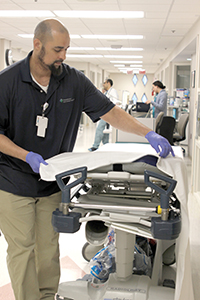Approach reaches into economically depressed neighborhoods, aids disadvantaged job seekers
By JULIE MINDA
Presence Health has hired a talent recruiting expert whose primary focus is improving how the system and its 10 Chicago-area hospitals attract top candidates to difficult-to-fill positions.

Pervis Colbert credits his employment with Presence Saint Joseph Hospital in Chicago to a job development program Presence Health has in place to recruit and retain candidates from vulnerable populations.
Reggie Allen's sights aren't on high-profile roles within the executive suites at Presence and its hospitals. He's concentrating on recruitment for entry-level positions in such areas as housekeeping, maintenance and dietary services. Job openings for such positions tend to attract scores of applicants — but it can be extremely difficult for hiring managers to determine which applicants will be the right fit, both initially and over time.
Allen, who joined Presence in July 2017 as system talent acquisition specialist, is working with human resources teams and hiring managers at Presence hospitals. He's helping them to build awareness in low-income communities of the wide variety of entry-level jobs available in health care, to identify ways the hospitals can partner with community organizations to create a pipeline of reliable job candidates and to develop training and education programs to help entry-level workers build a career path at Presence.

Allen
Allen says Presence, which was acquired by St. Louis-based Ascension in March, believes that being intentional about hiring disadvantaged job hunters "shows that Presence is serious about its mission and values. We want to have a positive impact — we want to give back."
The right stuff
According to a June 2016 article from the Society for Human Resource Management, more than two-thirds of organizations surveyed earlier that year reported having difficulty hiring for job openings. The labor market has tightened since. In the survey of more than 3,300 human resources professionals from various industries across the U.S., health care organizations were among those reporting the highest levels of difficulty in hiring.
The article said in addition to the problem of churn that was occurring with the nation's low unemployment rate and high number of job openings, respondents were finding that many of the applicants lacked needed skills and were not versed in what it takes to hold a job, like dependability. Survey respondents said it was common for job applicants to lack basic computer skills as well as the ability to write and speak with clarity. Applicants also commonly lacked critical thinking and problem-solving skills, the survey respondents said.
Stephanie Kujat, a recruiter for Chicago-based Presence, says that despite the current low unemployment rate, Presence facilities get many applications for entry-level jobs. But, she says, it can be very difficult for recruiters and hiring managers to tell from an application — or even from interviews and references — which applicants have the right characteristics to be an asset to Presence facilities over the long term. Allen says the goal is for the community organizations to vouch for the suitability of candidates.
Kujat also notes that many applicants that may not look good on paper possess the drive and work ethic to be a great associate. "There are so many people who have a rough time in life, but just want to be stable and work. It's tough for them" to get employment with a weak application.
Casting a wide net
Presence's new approach to hiring attempts to overcome such shortfalls to recruiting for unskilled, entry-level jobs — while also benefitting the communities Presence serves.
Allen and his human resources counterparts at the facility level have built or strengthened relationships with community nonprofits and other agencies that work with economically struggling community members, and can identify clients who would be good fits for jobs at Presence hospitals.
Some of the top partners in this referral effort are the not-for-profit Safer Foundation, which helps people with felony and misdemeanor criminal records as well as other blemishes on their records to secure employment; and the not-for-profit Cara, which assists impoverished people with skill-building, so they can get and retain good jobs.
Allen says there are a lot of misperceptions about the wide range of jobs available in hospitals and other health care facilities, including jobs for unskilled workers, and so he and his human resources colleagues at the facility level are educating people in economically vulnerable communities about the availability of jobs for unskilled workers — and the opportunity for advancement.
Allen also has been working with his human resources colleagues at Presence facilities to find ways to overcome barriers that historically have led to high turnover for entry-level, low-wage employees. They are looking at how best to offer training and education to prepare employees for job advancement. "We want them to grow, and we're also preparing them for a long career with Presence," says Allen.
Win-win-win
Allen and Kujat say that while Presence is still in the early phases of its intensified approach to recruiting from disadvantaged populations, the system already is seeing positive impact.
Presence sites have benefitted from having quality job candidates. The candidates themselves benefit from getting a second chance when other employers had overlooked their applications and low-income communities have benefitted as their citizens obtain meaningful employment from Presence.
The partnering organizations have referred numerous applicants for job openings. And, says Allen, while many of these applicants have criminal records or other red lights in their background, the community organizations that have worked with them have been able to attest to their suitability for a job with Presence.
The Safer Foundation helps job candidates complete the rigorous process needed to obtain from the Illinois Department of Public Health a waiver exempting them from the requirement to have a clean record to work at a health care facility. Allen says that on rare occasion, Presence will consider employing an individual who had committed a violent offense. "It is a much tougher proposition and many things have to fall in place correctly for it to happen," he says.
Green flag
Kujat says when Allen or other recruiters at the facility level refer a job candidate to her from a partner organization, she tags that candidate for the benefit of hiring managers. "The hiring managers definitely have seen a difference" with these flagged candidates, Kujat says. "They've noticed that candidates … from these sources are dedicated and reliable and want to work."
Allen says Presence already has screened several hundred applicants through this approach and Presence facilities have hired about 150 of those candidates. So far, the retention rate for these recruits is significantly higher than that of applicants from the broader population. He says candidates from agencies like Safer Foundation are "hungry" for success. "They don't squander the opportunities, they take full advantage."
Promise realized
Chicagoan Pervis Colbert, 44, was hired through Presence's new recruitment strategy. Colbert said that a few years ago he pleaded guilty to a misdemeanor charge of petty theft that remains on his record. He maintains his innocence. Despite a previously clean record, and experience in banking, customer service and sales, Colbert said he struggled to find a job after his conviction.
"I applied for so many jobs, and the interviews would go well, but then I wouldn't get the jobs," he says. "I could tell that if not for having this on my record, I would have gotten" one of those jobs.
Colbert is working with the Safer Foundation to get legal help to expunge his record, a step that is to happen early next year. The organization has helped him get a waiver to work in health care in the meantime. Through the Safer Foundation, Colbert learned that Presence would consider his application for employment despite his misdemeanor conviction.
Last fall, Presence Saint Joseph Hospital in Chicago hired Colbert as a patient food services representative, assisting patients by phone with determining what they could order to eat, in line with their dietary restrictions. The hospital promoted him in February, and now as a clinical tech aid — a full-time position with benefits — he transports patients between patient rooms and testing rooms at the hospital. He's now applying for another position.
Colbert says: "Society often turns their back on people who have something on their record, but Presence was so understanding and patient with me. I am so grateful to them, and I owe them everything."
Copyright © 2018 by the Catholic Health Association
of the United States
For reprint permission, contact Betty Crosby or call (314) 253-3490.